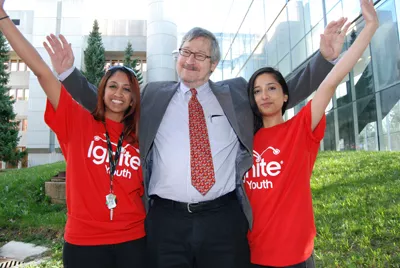
Talkin’ about a revolution
Rebels with a cause can improve lives and change the world—that was the theme of Ignite Youth Mississauga, a May 1 event featuring inspiring talks and creative performances that took place at the University of Toronto Mississauga.
Over six high-energy hours at a lecture theatre at UTM’s Communication, Culture and Technology building, about 300 local high school and UTM students learned about the empowering effects of personal revolution through brief presentations and live music by a broad mix of speakers and artists. The event was the kickoff to Mississauga’s festivities for National Youth Week and National Youth Arts Week, and was also the world’s first youth edition of Ignite, the popular speaker series on personal and professional passions that occurs in more than 100 cities internationally.
“The idea of rebellion has to do with how young people can go against the norm to make change in their communities,” says Sheryl Sharma, business development manager for Youth Troopers for Global Awareness (YTGA), the local social justice-oriented non-profit that organized the event.
Among the 11 speakers—10 live, one via video—were Ebenezer Tiku, who rebelled against the limited opportunities of his native Cameroon to pursue post-secondary education and a career; Shae Invidiata, founder of the anti-human trafficking group [free-them]; David Lockett, head of the Toronto-based charity PACT, which helps at-risk youth achieve their full potential; and D. Simon Jackson, founder of Spirit Bear Youth Coalition, the world’s largest youth-led environmental organization that works to protect the endangered white bear. All talks followed Ignite’s motto of “Enlighten us, but make it quick” approach of five-minute presentations using 20 slides that auto-advance every 15 seconds, so as to quickly get to the heart of ideas.
Also speaking was Professor Anthony Wensley, director of UTM’s Institute of Communication, Culture and Information Technology, who discussed the potential for technology to spur positive social change. He looked at how Twitter helped fuel the February 2011 uprising in Cairo’s Tahrir Square, which spurred the Arab Spring, but said youths wanting to promote lasting and meaningful institutional change, whether in the Middle East or elsewhere, must engage in ongoing and organized action.
“While tools like Twitter can be a catalyst for major revolutions, the impetus for change has to come from the people. Technology brings people together and it can get them enthusiastic about their issues, but the action has to come from the ground up,” Wensley says.
Punctuating the talks were performances by seven artists who focus on social issues and personal empowerment, including Farij Abbas, a spoken word artist who has dealt with child abuse and sex trafficking; rock singer Sarah-Jean Villa, a survival of sexual abuse who helps other victims and has also volunteered for World Aids Day, SickKids Hospital and The Salvation Army; and rock band Dreamwaves, which wrapped up the event with a song dedicated to Canada’s soldiers.
Interspersed throughout the affair were screenings of motivational videos, including one about a Pakistani man who spent his 22nd birthday doing good deeds in his community, and another on youths in an orchestra in Paraguay who turn garbage into instruments. As well, frequent raffles were held in which winners won t-shirts, restaurant gift certificates, movie tickets and gym memberships from the event’s sponsors, which, in addition to YTGA and UTM, included Winners, Partners Promotional Group, MYAC, Whole Foods Market, the City of Mississauga and Microsoft.
Says Sharma: “I hope the students took away that they can actually achieve anything and shape their futures.”
